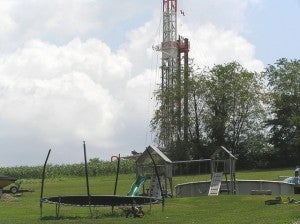Why The Oil And Gas Charm Offensive Fails To Win Public Hearts
 Oil and gas companies spend a lot of time and money reminding us just how much good they’re doing in the world. But according to a new Gallup poll released yesterday, when it comes to fracking, the American people aren’t convinced.
Oil and gas companies spend a lot of time and money reminding us just how much good they’re doing in the world. But according to a new Gallup poll released yesterday, when it comes to fracking, the American people aren’t convinced.
Production is booming and prices are the lowest in decades, due in large measure to fracking and a suite of other technological innovations that have led a revolution in production from ‘unconventional’ sources of oil and gas in the U.S. In particular, the rapid increase in natural gas production is providing a boon to consumers and helping to reduce our dependence on coal, which in turn has helped reduce carbon dioxide and other pollution.
And yet the new poll shows that just 60 percent of Americans surveyed are either opposed or undecided about fracking.
Why?
Because you can’t look at the news or your social media without confronting bad news from the places where major oil and gas production is taking place: Earthquakes in Oklahoma, water scarcity in Texas, air pollution in Wyoming, leaking pits of toxic wastewater in California. It’s all evidence that neither industry and nor regulators have a full handle on the real environmental and public health risks that come with unconventional oil and gas production
And with rare exceptions, the industry never misses an opportunity to fight better oversight. In fact on the same day the poll was published, oil and gas industry lawyers were in court to block sensible federal regulation of fracking on public lands, and their lobbyists were railing against Pennsylvania’s efforts to improve oversight of the industry’s water and waste management practices.
The industry ought to be concerned about all this. But mostly, they have been dismissive of the problems they face in the communities where they operate.
It’s true local activism can sometimes take an alarmist tone that’s easy for some to write off. But it is a big mistake to think the majority of concerned voices speaking out today are coming from the lunatic fringe. In my experience, many of them are actually supportive of domestic oil and gas development. But they are understandably concerned about an anything-goes mentality when it comes to air and water pollution in their neighborhoods.
For most of these folks, the goal is simple: They want meaningful oversight and real accountability. But if they can’t get that, they’re a lot more likely to start drawing lines in the sand. Just ask the citizens of Denton, Texas, where 59 percent of the voters checked the box to ban fracking altogether.
The considerable public relations campaigns funded by the American Petroleum Institute and America’s Natural Gas Alliance have earned the industry a core constituency in support of ‘fracking’ but 60 percent of Americans aren’t buying it.
So, here’s an idea: Rather than doubling down on a strategy of fighting all manner of reasonable regulatory oversight, let’s choose a different path. For starters, how about we pick an issue – methane pollution, for example, and work together to get a sensible regulatory framework in place?
Instead of betting that the good news economic story absolves it of the need to be responsive to community and environmental concerns, the oil and gas industry should embrace oversight and accountability as necessary to earn and keep the public’s trust.
Perhaps then, those who are undecided, and those who are opposed will have reason to reconsider their views.
Photo credit: Nadia Steinzor, Earthworks.












3 Comments
Well-stated! While collaboration and a more positive response to essential regulation are part of what industry needs to do, the other part is more robust disclosure to investors and the public about environmental risks and community impacts and how companies are addressing these. For example, it’s not good enough to express a preference for environmentally friendly frac fluids. What are the most toxic ones the company’s eliminated? Nor is it good enough simply to focus on corporate philanthropy in local communities. Companies need to identify the impacts communities have expressed concern about, from traffic to road damage to noise and the like, spell out what they are in the places they operate, and specifically indicate how they’re responding. At the Investor Environmental Health Network, with our investor partners we’ve published guidelines for disclosure, Extracting the Facts, and two disclosure scorecards, Disclosing the Facts. The scorecards show that some companies have shown marked improvements in their disclosures, but generally the industry falls way short of what it should be doing. It should direct resources away from glossy PR campaigns towards developing, tracking, and disclosing meaningful data on risk management. For Extracting the Facts, see: http://iehn.org/documents/frackguidance.pdf. For the scorecards, visit http://www.disclosingthefacts.org
We are great fans of IEHN’s work. Thank you, Rich.
Some interesting commentary from Fortune.com:
“The shale oil revolution is in danger”
“Right now, all signs are pointing to retreat. The count of rotary rigs in use—a proxy for new drilling—has fallen from 1,930 to 1,881 since October, after soaring during most of 2014. Continental Resources, a major force in shale, has announced that it will lower its drilling budget by 40% in 2015. Because of the constant need to drill, frackers are always raising more and more money by selling equity, securing bank loans, and selling junk bonds. Many are already heavily indebted. It’s unclear if banks and investors will keep the capital flowing at these prices.”